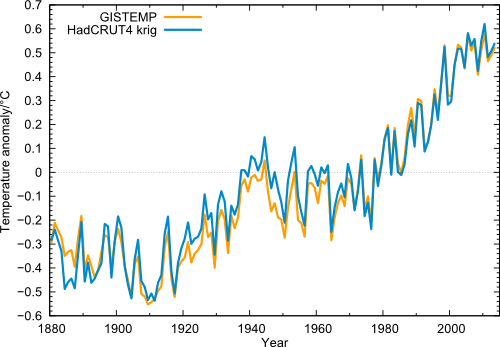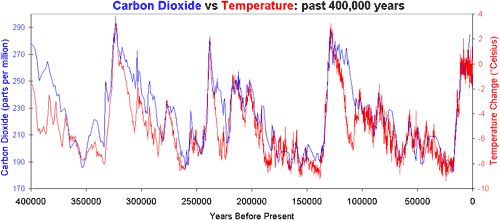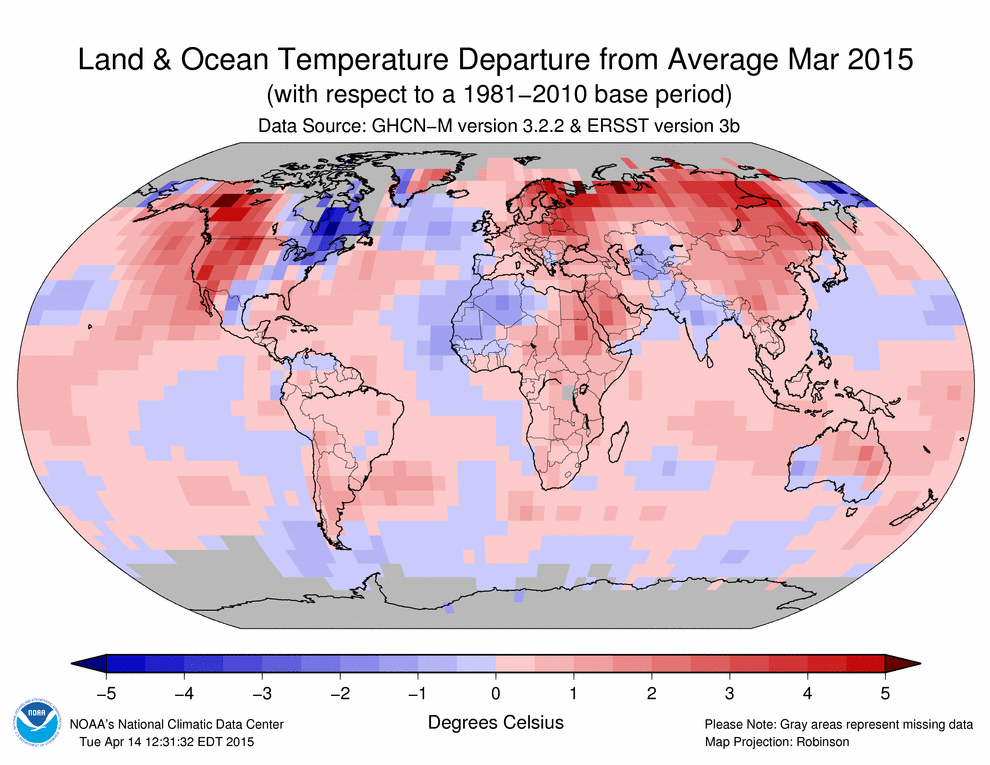I started this thread eight months ago and the topic concerned the fact that even then, back in September 2014, climate scientists were predicting that 2014 was very likely to be the next new 'hottest year on record'. Well, 2014 did, in fact, turn out to be the new hottest year on record. And now, so far, 2015 is even hotter, and, with the El Niño in the Pacific, this year is now on track to become next new hottest year on record, further demolishing the idiotic denier cult propaganda memes.
The scientific fact is that Earth is continuously warming and had been for many decades now. As long as atmospheric carbon dioxide levels remain severely elevated as they are now, less energy will be able to escape away into space than is being received from the sun
every day, so our planet will continue to warm up a little more every year. Variations in several natural climate factors can, to some degree, either enhance or mask the reflection of the underlying continuous warming trend in the surface air temperature records. Surface air temperatures account for less than 3% of the sun's energy the Earth is receiving, while the oceans are absorbing over 90% of the sun's heat. Even in just the surface air temperature record though, the warming trend is very clear. Good instrumental surface air temperature records extend back to 1880, and much farther in certain specific locales.
 Figure 1 Global temperature (annual values) in the data from NASA GISS (orange) and from Cowtan & Way (blue), i.e. HadCRUT4 with interpolated data gaps. (source - RealClimate)
Figure 1 Global temperature (annual values) in the data from NASA GISS (orange) and from Cowtan & Way (blue), i.e. HadCRUT4 with interpolated data gaps. (source - RealClimate)
In this thread, I had mentioned that November 2013 was THE warmest November on record and that January 2014 was the 4th warmest January on record and also the 347th
consecutive month with an average global temperature above the 20th century average. Well, 2014 turned into a string of record high temperature months and ended up being the next new 'hottest year on record', above 2010 and 2005, the previous record holders.
* March 2014 was also, like January, the fourth warmest March on record, surpassing the old record high set in March 2010, the previous hottest year on record.
* April 2014 tied with April 2010 for the record highest global average temperatures for the month.
* May was THE hottest May on record, surpassing the previous record high set in 2010. Four of the five warmest Mays on record have occurred in the past five years: 2010 (second warmest), 2012 (third warmest), 2013 (fifth warmest), and 2014 (warmest); currently, 1998 has the fourth warmest May on record. Additionally, May 2014 marked the 39th consecutive May and 351st consecutive month (more than 29 years) with a global temperature above the 20th century average.
* June was also the hottest June on record. Nine of the ten warmest Junes on record have occurred during the 21st century, including each of the past five years. Additionally, June 2014 marked the 38th consecutive June and 352nd consecutive month with a global temperature above the 20th century average. The last below-average global temperature for June was June 1976 and the last below-average global temperature for any month was February 1985.
* July 2014, like January and March, ended up being the fourth warmest July on record. Eight of the 10 warmest July's have occurred within the past 10 years (2002 also ranks among the 10 warmest).
* August 2014 was the warmest August on record for the globe since records began in 1880. Nine of the 10 warmest August's on record have occurred during the 21st century. Additionally, August 2014 marked the 38th consecutive August with a temperature above the 20th century average. The last below-average global temperature for August occurred in 1976.
* September 2014 also set a record as the warmest September in the 135-year period of record.
* October 2014 also set a record with global temperature averaged across the world's land and ocean surfaces coming in as the highest on record for the month, at 0.74°C (1.33°F) above the 20th century average. This also marks the third consecutive month and fifth of the past six with a record high global temperature for its respective month (July was fourth highest).
* November 2014 was the seventh warmest November on record. The 12 warmest Novembers on record have all occurred during the 21st century.
* December 2014 also set the record as the hottest December since records began in 1880, surpassing the previous record set in 2006. This is the 10th consecutive month (since March 2014) with a global monthly temperature ranking among the seven highest for its respective month. December also marks the sixth month of 2014 to set a new monthly high temperature record. December was the 358th consecutive month with a global temperature above the 20th century average.
The year 2014 was the warmest year across global land and ocean surfaces since records began in 1880. The annually-averaged temperature was 0.69°C (1.24°F) above the 20th century average of 13.9°C (57.0°F), easily breaking the previous records of 2005 and 2010. This also marks the 38th consecutive year (since 1977) that the yearly global temperature was above average. Including 2014, 9 of the 10 warmest years in the 135-year period of record have occurred in the 21st century. 1998 currently ranks no higher than the fourth warmest year on record.
So, 2014, from January to December, was the hottest calendar year on record going back to at least 1880 with the instrumental record, and very probably much, much further back according to the proxie temperature records. The calendar year is arbitrary. Scientists also calculate the running hottest twelve months on record. This has provided additional evidence of the continuing increase in global temperatures. After the 2014 calendar year captured the record as the hottest year on record, February 2014 to January 2015 beat the record to become the new hottest twelve months on record. But that record was short lived since March 2014 to February 2015 wound up as the new hottest twelve months on record. Now that record has also been broken because April 2014 to March 2015 is currently the new hottest twelve months on record. With the El Niño conditions in the pacific, the rest of 2015 will almost certainly be breaking even more high temperature records.

This is a 12-month moving average, that shows the march of temperature changes over time, rather than just once every calendar year,
2015 Already Setting Heat Records
LiveScience
by Becky Oskin, Senior Writer
April 17, 2015
The first three months of 2015 set new global heat records, government officials announced today (April 17). January, February and March set new high-temperature records, respectively; each month was warmer than any on the books since record keeping started 136 years ago. March also ended the hottest 12-month period on record, the National Oceanic and Atmospheric Administration (NOAA) reported. Seven of the past 11 months have tied or set new record-high monthly temperatures.
Temperature differences (from the global average) during March. - Credit: NOAA

















 Intermediate
Intermediate 





